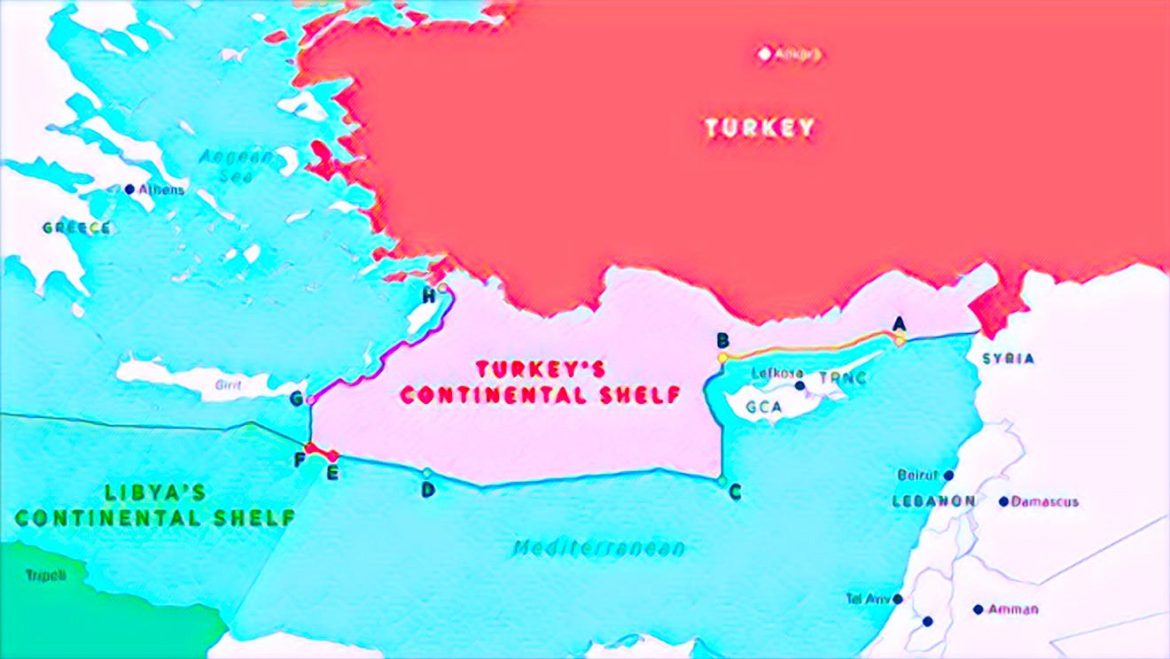- Greece has formally rejected Libya’s maritime claims in a UN filing, citing violations of international law and defending its rights to explore near Crete.
- The dispute stems from a 2019 Turkish-Libyan maritime deal, which Greece says unlawfully ignores its island territories.
- Athens remains open to dialogue with Tripoli but insists any negotiations must respect the maritime rights of Greek islands under UNCLOS.
Greece has strongly opposed Libya‘s claims to the sea in the Eastern Mediterranean. It did this by formally rejecting Tripoli’s objections to recent plans to explore for oil and gas near Crete and by sending a letter to the United Nations, UN, to back up its position.
Athens sent a carefully worded message to the UN saying that its hydrocarbon exploration activities are only happening in its continental shelf and Exclusive Economic Zone (EEZ), which is in line with the United Nations Convention on the Law of the Sea (UNCLOS).
The move shows how determined Greece is to assert its sovereign rights in the area, even though tensions are high over a maritime agreement between Libya and Turkey from 2019 that Greece says is both illegal and geographically unsound.
The disagreement, which has been going on for years, is about different interpretations of maritime boundaries and sovereign rights in a strategically important, energy-rich part of the Mediterranean.
The 2019 Memorandum of Understanding (MoU) between Ankara and Libya’s former Government of National Accord (GNA) is at the center of the controversy. That deal made an EEZ that went from the Libyan coast to the Turkish coast, but it didn’t give Greek islands like Crete and Rhodes any maritime rights.
Athens has always said that the Turkish-Libyan agreement breaks international law, specifically UNCLOS rules that protect island states’ rights to their own maritime zones.
This has been backed by several EU and international partners. Greece repeated this point in its most recent submission to the UN, saying that the coordinates used in its exploration blocks are based on median lines drawn from both mainland and island coasts, as international conventions say they should be.
Energy ambitions clash with geopolitics as Greece reasserts its island rights
Greece’s exploration tenders, launched earlier this year, sparked anger from Tripoli, which accused Athens of encroaching on its waters. But Greek officials argue that these blocks are not only lawful but also fall within maritime boundaries delineated in a separate EEZ agreement between Greece and Egypt. That pact, signed in 2020, was viewed as a direct response to the Turkish-Libyan deal, and it further complicates the already murky geopolitics of the region.
Athens’s filing to the UN also explicitly rejects Libyan maritime maps used to assert claims in the region, labeling them as “inconsistent with international law” and lacking legal validity. In particular, Greek authorities take issue with any maps that align with the 2019 Turkish-Libyan memorandum, which they say produces “no legal effects” and fails to recognize Greece’s islands and their associated maritime rights.
Still, amid the hardline diplomatic language, Greece is leaving the door open for talks. Prime Minister Kyriakos Mitsotakis has offered to establish a technical negotiating team to work with Libyan authorities on a peaceful delimitation of maritime zones. The proposal is seen as a diplomatic olive branch but comes with a caveat: Greece is not prepared to compromise on what it sees as a fundamental principle of maritime law—that islands have the same rights as continental territories.
The broader context is unmistakably geopolitical. Greece is pressing ahead with offshore energy exploration as part of a broader strategy to diversify its energy sources and reduce reliance on imported fossil fuels. At the same time, Turkey’s expanding role in Libya’s energy and security sectors—most recently reaffirmed by a new bilateral energy deal—has raised concerns in Athens and throughout the EU about Ankara’s long-term strategic ambitions in the Mediterranean.
By escalating the matter to the UN while extending a hand for talks, Greece is signaling both resolve and restraint. Whether Tripoli responds in kind, or doubles down on its claims in concert with Ankara, could shape the trajectory of Mediterranean diplomacy—and energy politics—for years to come.



